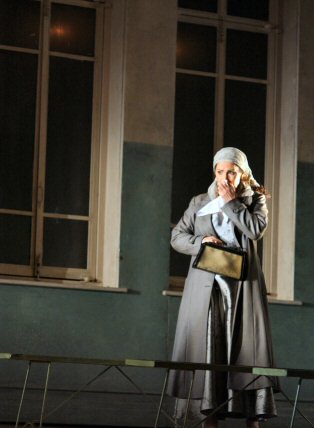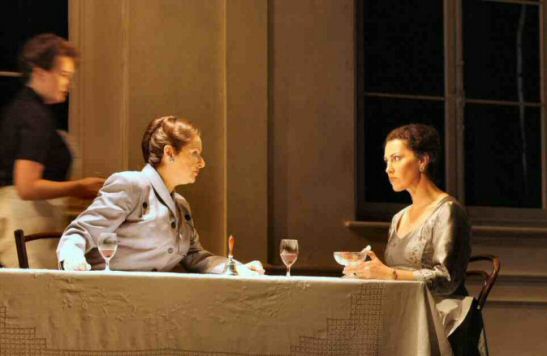S & H Opera Review
Janacek,
Katya Kabanova, (revival première) Welsh
National Opera, Cardiff June 5th (BK)
Conductor: Steven Sloane
Director: Katie Mitchell
Revival Director: Elaine Kidd
Designer: Vicki Mortimer
Lighting Designer: Paule Constable
Photographs: Nicholas LieberCast
Kudryash: David Curry
Glasha: Sarah Pope
Dikoy: Alan Fairs
Boris: Tom Randle
Feklusha: Joanne Thomas
Kabanicha: Suzanne Murphy
Tichon Kabanov: Andrew Forbes-Lane
Varvara: Arlene Rolph
Katerina (Katya) Kabanova: Cheryl Barker
Kuligin: Alastair Moore
Woman in church: Jessica Handley Greaves
Boatman: Simon Curtis
WNO Orchestra and Chorus
Chorus Master: Donald Nally

Cheryl Barker as Katya
Maybe it was the heat – it was very warm in Cardiff on Saturday evening – or perhaps it was first night jitters or under-rehearsal, but while nothing went actually wrong in this revival of WNO’s Katya, the performance was short on excitement during Acts I and II. It was all thoroughly competent of course, WNO is never less than that, but ‘lacking rapture’ was a phrase that sprang to mind by the interval.
Janacek wrote that Katya, his sixth opera, was ‘one of my most tender works,’ and his score contrasts extreme beauty with fateful oppression to wonderful emotional effect. Every bit of this came fully to life after the interval when Steven Sloane’s conducting of Act III restored all the previously missing passion. Singers and orchestra responded to Sloane’s direction wholeheartedly and yet more world class opera was the result.
Suzanne Murphy (Kabanicha) and Cheryl Barker
The sets are austere in this production. Act I and the end of Act III are set in the waiting room/ cafeteria of a boat station on the banks of the Volga. Painted in institutional faded green, this is the sort of place where they sell the Russian equivalent of old-style British Railways’ individual fruit pies. No-one enjoys them much; they’re just something to eat while waiting for your transport out.For the other scenes, simple full-width dropped sets represent the interior of the Kabanov’s home, the garden in Act II and the ruined church for the first scene of Act III. Colours are uniformly drab and the period costumes are muted. It’s a cheerless setting for a cheerless tale.
The direction points up cheerlessness too, with one small and interesting exception. Abusive power, oppression and the guilt that characterise this libretto are emphasised constantly. This Kabanicha presses every one of Tichon’s emotional buttons to make him squirm and even Katya’s happy memories of her life before marriage bring her little comfort. The two sets of lovers, Varvara and Kudryash, Boris and Katya, are unable to take delight from their relationships and Katya’s guilt particularly, stifles rejoicing.
The exception to the overall gloom is the scene between Dikoy and the Kabanicha, where the mutual comfort they bring each other is almost touching. The couple light cigarettes together and then waft the smoke through the room’s open window. For a brief moment they cease to be malicious tyrants and seem more like naughty children happy in their latest prank; a reminder perhaps that the need for human contact always lies somewhere behind the harshest exteriors.
As well as a new conductor, this revival has an almost complete set of new principals. Suzanne Murphy (the Kabanicha,) Alan Fairs (Dikoy) and Sarah Pope (Glasha) are the old-hands from the original production and were all in good voice throughout this performance. Their characterisations were strong too, and clearly came from sound experience.
The revival has three strong tenors, at least potentially. David Curry (Kudryash) and Andrew Forbes-Lane (Tichon) were both in excellent voice with fine strain-free notes, ringing tenor sound and excellent diction. Tom Randle (Boris) on the other hand, was more of a puzzle. In Act I, scene 1 his voice did not project well, had a slight baritonal quality in the chest register and at times was quite difficult to hear clearly. Later, the voice improved a good deal and it was obvious during the garden scene that this is an excellent instrument especially in its upper ranges. Having heard Tom Randle live several times in the last year of so (most recently as Gerontius in Birmingham where I commented on his particularly muscular tone) rightly or wrongly I am left with the impression that he is sometimes inclined to overdo ‘manliness.’ When he sings simply, the voice reveals itself for what it really is: something rather special.
Arlene Rolph’s portrayal of Varvara was nicely gauged to reveal the defiant quality needed in the role. Her attractive singing, delicate and forceful by turns also made a fine foil for Cheryl Barker’s Katya which was itself of very high quality especially in Act III. Hers is yet another voice to be added to the ever-growing list of fine principal sopranos appearing at WNO.
Bill Kenny

 Return to:
Return to: